Henry+David+Thoreau
Henry-David-Thoreau-大卫梭罗
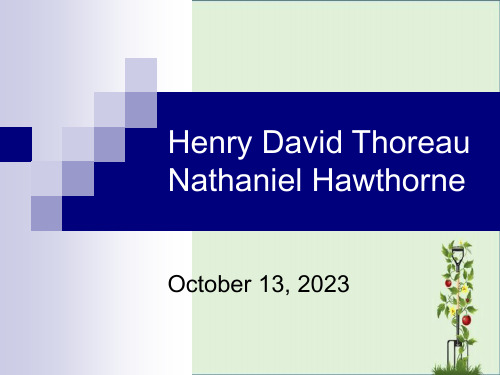
1. Henry David Thoreau (2)
1. Henry David Thoreau (3)
He was born in Concord, Massachusetts. From 1841 to 1843 Thoreau lived in the home
of American essayist and transcendental philosopher Ralph Waldo Emerson. In 1845 Thoreau moved to a crude hut on the shores of Walden Pond, where he devoted his time to studying nature, meditating on philosophical problems, reading classic literature, and holding long conversations with his neighbors.
Reading Assignments
1. Henry David Thoreau (1)
1817-1862, American writer, philosopher, and naturalist, whose work demonstrates how the abstract ideals of libertarianism and individualism can be effectively instilled in a person”s life.
1. Henry David Thoreau (6)
Studies on Thoreau 王光林:《美国的梭罗争论》,《华东师
范大学学报》〔哲学社会科学版〕,2023 年第6期,第99-103+117页。 陈爱华:《梭罗在中国:1949至2023》, 《四川外语学院学报》,2023年第2期,第 42-45页。
Henry David Thoreau梭罗

main work
康科德河和梅里麦克河上的一个星期 (A Week on the Concord and Merrimac Rivers ,1849 年) 论公民的不服从权利,又译作消极反抗 (Civil Disobedience ,1849年) 马萨诸赛州的奴隶制度 (Slavery in Massachusetts ,1854年) 瓦尔登湖,又译作湖滨散记 (Walden ,1854年) 为约翰·布朗上校请愿 (A Plea for Captain John Brown ,1860年) 远足 (Excursions ,1863年) 缅因森林 (The Maine Woods ,1864年) 科德角 (Cape Cod ,1865年) 马萨诸赛州的早春 (Early Spring in Massachusetts,1881年) 夏 (Summer ,1884年) 冬 (Winter ,1888年) 秋 (Autumn ,1892年) 杂录 (Miscellanies ,1894年) 梭罗最初与最后的旅行,最近发现于梭罗未发表的日记和手稿中(The First and Last Journeys of Thoreau ,1905年)
* 冬天的禽兽(Winter Animals )
* 冬天的湖(The Pond in Winter)
* 春天(Spring )
* 结束语(Conclusion
Theme
Simplicity: Simplicity seems to be Thoreau's model for life. Throughout the book, Thoreau constantly seeks to simplify his lifestyle
After that, he met his mutual friend, Emerson, who was 14 years his senior, took a paternal and at times patronizing interest in Thoreau, advising the young man and introducing him to a circle of local writers and thinkers.
英语故事-Henry David Thoreau

英语故事Henry David Thoreau亨利·戴维·梭罗,美国作家、哲学家,超验主义代表人物,也是一位废奴主义及自然主义者,有无政府主义倾向,曾任职土地勘测员。
Henry David ThoreauHenry David Thoreau (born David Henry Thoreau; July 12, 1817 – May 6, 1862) was an American author, poet, naturalist, tax resister, development critic, surveyor, historian, philosopher, and leading transcendentalist. he is best known for his book Walden, a reflection upon simple living in natural surroundings, and his essay, civil disobedience, an argument for individual resistance to civil government in moral opposition to an unjust state.Thoreau’s books, articles, essays, journals, and poetry total over 20 volumes. Among his lasting contributions were his writings on natural history and philosophy, where he anticipated the methods and findings of ecology and environmental history, two sources of modern day environmentalism. His literary style interweaves close natural observation, personal experience, pointed rhetoric, symbolic meanings, and historical lore; while displaying a poetic sensibility, philosophical austerity, and “Yankee”loves of practical detail. He was also deeply interested in the idea of survival in the face of hostile elements, historical change, and natural decay; at the same time imploring one to abandon waste and illusion in order to discover life’s true essential needs. He was a lifelong abolitionist, delivering lectures that attacked the fugitive slave law while praising the writings of Wendell Phillips and defending abolitionist John brown. Thoreau’s philosophy of civil disobedience influenced the political thoughts and actions of such later figures as Leo Tolstoy, Mahatma Gandhi, and Martin Luther king, Jr. Thoreau is sometimes cited as anindividualist anarchist. though civil disobedience calls for improving rather than abolishing government –“I ask for, not at once no government, but at once a better government”–the direction of this improvement aims at anarchism: “‘that government is best which governs not at all;’ and when men are prepared for it, that will be the kind of government which they will have.”Early life and educationHe was born David Henry Thoreau in Concord, Massachusetts, to John Thoreau (a pencil maker) and Cynthia Dunbar. His paternal grandfather was of French origin and was born in jersey. His maternal grandfather, Asa Dunbar, led Harvard’s 1766 student “Butter rebellion”, the first recorded student protest in the colonies. David Henry was named after a recently deceased paternal uncle, David Thoreau. He did not become “Henry David” until after college, althoughhe never petitioned to make a legal name change. He had two older siblings, Helen and John Jr., and a younger sister, Sophia. Thoreau’s birthplace still exists on Virginia road in concord and is currently the focus of preservation efforts. The house is original, but it now stands about 100 yards away from its first site.Portrait of Thoreau from 1854amos Bronson Alcott and Thoreau’s aunt each wrote that “Thoreau”is pronounced like the word “thorough”, whose standard American pronunciation rhymes with “furrow”. Edward Emerson wrote that the name should be pronounced “Thó-row, the h sounded, and accent on the first syllable.”in appearance he was homely, with a nose that he called “my most prominent feature.” of his face, Nathaniel Hawthorne wrote: “Thoreau is as ugly as sin, long-nosed, queer-mouthed, and with uncouth and rustic, though courteous manners, corresponding very well with such an exterior. But his ugliness is of an honest and agreeable fashion, and becomes him much better than beauty.” Thoreau also wore a neck-beard for many years, which he insisted manywomen found attractive. However, Louisa may Alcott mentioned to Ralph Waldo Emerson that Thoreau’s facial hair “will most assuredly deflect amorous advances and preserve the man’s virtue in perpetuity.” Thoreau studied at Harvard University between 1833 and 1837. He lived in Hollis Hall and took courses in rhetoric, classics, philosophy, mathematics, and science.A legend proposes that Thoreau refused to pay the five-dollar fee for a Harvard diploma. in fact, the master’s degree he declined to purchase had no academic merit: Harvard College offered it to graduates “who proved their physical worth by being alive three years after graduating, and their saving, earning, or inheriting quality or condition by having five dollars to give the college.” his comment was: “let every sheep keep its own skin”, a reference to the tradition of diplomas being written on sheepskin vellum.Civil disobedience and the Walden years: 1845–1849Thoreau embarked on a two-year experiment in simple living on July 4, 1845, when he moved to a small, self-built house on land owned by Emerson in a second-growth forest around the shores of Walden Pond. The house was not in wilderness but at the edge of town, 1.5 miles (2.4 km) from his family home. On July 24 or July 25, 1846, Thoreau ran into the local tax collector, Sam Staples, who asked him to pay six years of delinquent poll taxes. Thoreau refused because of his opposition to the Mexican-American war and slavery, and he spent a night in jail because of this refusal. (The next day Thoreau was freed, against his wishes, when his aunt paid his taxes.) The experience had a strong impact on Thoreau. In January and February 1848, he delivered lectures on “the rights and duties of the individual in relation to Government”explaining his tax resistance at the concord lyceum. Bronson Alcott attended the lecture, writing in his journal on January 26: heard Thoreau’s lecture before the lyceum on the relation of the individual to the state– an admirable statement of the rights of the individual to self-government, and an attentive audience. His allusions to the Mexican War, to Mr. Hoar’s expulsion from Carolina, his own imprisonment in concord jail for refusal to pay his tax, Mr. Hoar’s payment of mine whentaken to prison for a similar refusal, were all pertinent, well considered, and reasoned. I took great pleasure in this deed of Thoreau’s. —Bronson Alcott, Journals (1938)Thoreau revised the lecture into an essay entitled resistance to civil government (also known as civil disobedience). In May 1849 it was published by Elizabeth Peabody in the aesthetic papers. Thoreau had taken up a version of Percy Shelley’s principle in the political poem The Mask of Anarchy (1819) that Shelley begins with the powerful images of the unjust forms of authority of his time –and then imagines the stirrings of a radically new form of social action. At Walden Pond, he completed a first draft of a week on the concord and Merrimack Rivers, an elegy to his brother, John, that described their 1839 trip to the White Mountains. Thoreau did not find a publisher for this book and instead printed 1,000 copies at his own expense, though fewer than 300 were sold. Thoreau self-published on the advice of Emerson, using Emerson’s own publisher, Munroe, who did little to publicize the book. Its failure put Thoreau into debt that took yearsto pay off, and Emerson’s flawed advice caused a schism between the friends that never entirely healed. In august 1846, Thoreau briefly left Walden to make a trip to Mount Katahdin in Maine, a journey later recorded in “Ktaadn,” the first part of The Maine Woods.Thoreau left Walden Pond on September 6, 1847. Over several years, he worked to pay off his debts and also continuously revised his manuscript for what, in 1854, he would publish as Walden, or life in the woods, recounting the two years, two months, and two days he had spent at Walden Pond. The book compresses that time into a single calendar year, using the passage of four seasons to symbolize human development. Part memoir and part spiritual quest, Walden at first won few admirers, but today critics regard it as a classic American work that explores natural simplicity, harmony, and beauty as models for just social and cultural conditions.。
有关梭罗的英语作文
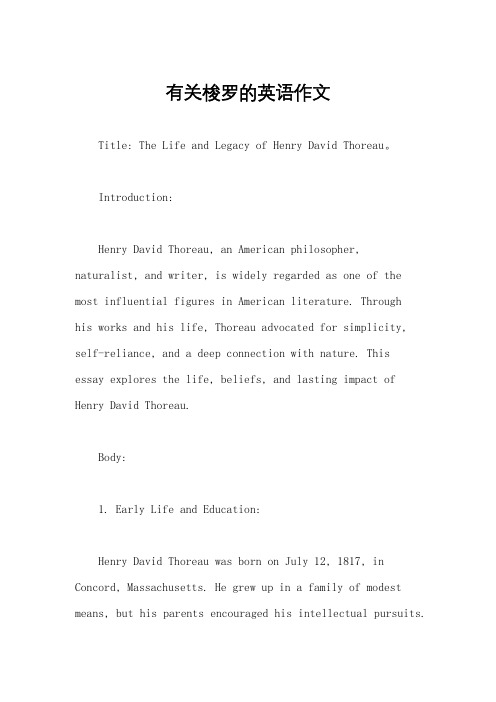
有关梭罗的英语作文Title: The Life and Legacy of Henry David Thoreau。
Introduction:Henry David Thoreau, an American philosopher,naturalist, and writer, is widely regarded as one of the most influential figures in American literature. Throughhis works and his life, Thoreau advocated for simplicity, self-reliance, and a deep connection with nature. Thisessay explores the life, beliefs, and lasting impact of Henry David Thoreau.Body:1. Early Life and Education:Henry David Thoreau was born on July 12, 1817, in Concord, Massachusetts. He grew up in a family of modest means, but his parents encouraged his intellectual pursuits.Thoreau graduated from Harvard University in 1837, where he developed a deep interest in literature, philosophy, and natural sciences.2. Walden and the Philosophy of Simplicity:Thoreau's most famous work, "Walden," published in 1854, is a reflection on his experience living in a cabin near Walden Pond for two years. In this book, Thoreau explores the themes of simplicity, self-reliance, and the importance of living in harmony with nature. He believed that by simplifying our lives and reducing our material possessions, we could achieve a deeper sense of fulfillment and freedom.3. Civil Disobedience and Political Activism:Thoreau was also known for his essay "Civil Disobedience," published in 1849. In this essay, he argues that individuals have a moral obligation to resist unjust laws and government actions. Thoreau's ideas on civil disobedience influenced many future leaders, including Mahatma Gandhi and Martin Luther King Jr., who usednonviolent resistance to fight for social justice.4. Naturalist and Environmentalist:Thoreau had a deep love for the natural world and spent much of his time studying and observing nature. He believed that nature was a source of spiritual and intellectual inspiration. Thoreau's writings on nature and his advocacy for the preservation of wilderness areas laid the foundation for the modern environmental movement.5. Influence and Legacy:Thoreau's writings and philosophy continue to inspire people around the world. His emphasis on simplicity, self-reliance, and the importance of nature resonates with individuals seeking a more meaningful and sustainable way of life. Thoreau's ideas on civil disobedience and resistance have also had a lasting impact on social and political movements.Conclusion:Henry David Thoreau's life and works continue to be celebrated for their profound influence on American literature, philosophy, and environmentalism. His belief in simplicity, self-reliance, and the importance of nature serve as a timeless reminder of the need to live in harmony with our surroundings. Thoreau's ideas on civil disobedience also remind us of the power of individual action in the face of injustice. Overall, Thoreau's legacy serves as a guiding light for those seeking a more meaningful and purposeful existence.。
梭罗
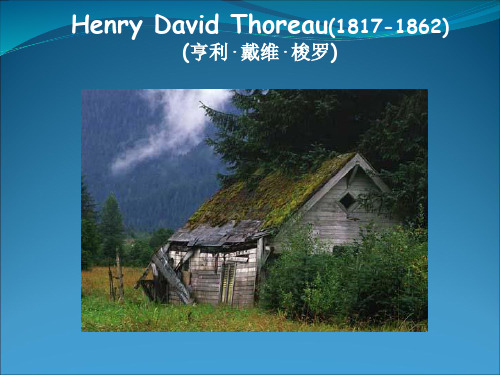
指划破,病毒迅速蔓延,发展成了牙关紧闭症(败血症的一 种)。十天之后,约翰溘然长逝。梭罗伤心欲绝,三个月闭 门不出。
哥哥的逝世和艾伦的拒绝成为梭罗一生的痛。从此梭罗再
也没有爱上过任何人。
梭罗的生活 理念
Simplify , simplify, simplify.
2.作品
《康科德河和梅里麦克河上的一个星期 》(A Week on the Concord and Merrimac Rivers ,1849年) 《论公民的不服从权利》,又译作《消极反抗 》 (Civil Disobedience ,1849年) 《马萨诸赛州的奴隶制度》 (Slavery in Massachusetts ,1854 年) 《为约翰· 布朗上校请愿 》(A Plea for Captain John Brown ,1860年) 《远足 》(Excursions ,1863年) 《缅因森林》 (The Maine Woods ,1864年) 《科德角》(Cape Cod ,1865年) 《马萨诸赛州的早春》 (Early Spring in Massachusetts) 杂录 (Miscellanies ,1894年) 《梭罗最初与最后的旅行》,最近发现于梭罗未发 表的日记和手稿中(The First and Last Journeys of Thoreau ,1905年)
Where I Lived
What I Lived For
路漫漫其修 远兮 吾将上下而 求索
3.Masterpiece -Walden
《瓦尔登湖》内容简介
梭罗远离尘嚣,他想在自然的安谧中寻找一种本真的生存状态,寻求一种 更诗意的生活。《瓦尔登湖》一书,详细地记录了作家在长达两年的时间里的 日常生活状态以及所思所想,他在小木屋旁开荒种地,春种秋收,自给自足。 他是一个自然之子,他崇尚自然,与自然交朋友,与湖水、森林和飞鸟对话, 在林中观察动物和植物,在船上吹笛,在湖边钓鱼,晚上,在小木屋中记下自 己的观察和思考。他追求精神生活,关注灵魂的成长,他骄傲地宣称:“每个 人都是自己王国的国王,与这个王国相比,沙皇帝国也不过是一个卑微小国, 犹如冰天雪地中的小雪团。”梭罗以他的实际行动告诉我们:人们所追求的大 部分奢侈品,大部分的所谓生活的舒适,非但没有必要,而且对人类进步大有 妨碍。 《瓦尔登湖》记述了作者在简单生活中深入思考与重塑自我的心路历程, 文笔宁静恬淡,引人深思,具有一种使人沉静的力量。
亨利·戴维·梭罗语录

亨利·戴维·梭罗语录“Go confidently in the direction of your dreams. Live the life you have imagined.”Henry David Thoreau.Living a life that is true to oneself and following one's dreams is a concept that has been echoed throughout history by many great thinkers and philosophers. Henry David Thoreau, an American essayist, poet, and philosopher, believed in the importance of living a life that is authentic and fulfilling. His words, "Go confidently in the direction of your dreams. Live the life you have imagined," serve as a powerful reminder for all of us to pursue our passions and live a life that is truly our own.Thoreau's words encourage us to have the courage to follow our dreams and to live a life that is in alignment with our deepest desires and aspirations. It is easy to get caught up in the expectations and demands of the world around us, but Thoreau reminds us that true fulfillment comes from living a life that is authentic and true to ourselves.Following our dreams and living the life we have imagined requires confidence and belief in ourselves. It means stepping outside of our comfort zones and taking risks in order to pursue what truly matters to us. It means being willing to face challenges and setbacks along the way, but also having the resilience to keep moving forward.Thoreau's words also remind us that our dreams and aspirations are unique to each of us. What may be fulfilling for one person may not be the same for another. It is important to honor our individual paths and to not compare ourselves to others. By living the life we have imagined, we are embracing our own values, passions, and purpose.In today's fast-paced and often chaotic world, it can be easy to lose sight of our dreams and aspirations. We may find ourselves caught up in the daily grind, feeling as though there is never enough time or energy to pursue what truly matters to us. However, Thoreau's words serve as a powerful reminder that it is never too late to start living the life we have imagined. It is never too late to take a step in the direction of our dreams and to start creating the life that we truly desire.Ultimately, Thoreau's words inspire us to live with intention and purpose. They remind us that we have the power to create the life we want, and that it is never too late to start. By going confidently in the direction of our dreams and living the life we have imagined, we can experience a sense of fulfillment and joy that comes from living authentically and in alignment with our true selves.。
亨利·戴维·梭罗(Henry David Thoreau)

弥尔顿故居
弥尔顿画像
作品:
• "Paradise Lost"《失乐园》 • "paradise"《复乐园》 • "Samson"《力士参和孙》
• But headlong joy is ever on the wing. • ——John Milton,British poet • 轻率的快乐总是瞬息即逝。 • ——英国诗人 弥尔顿.J.
作品:
His poem language vivid, simple, often in plain in the magic show, and lofty mood often have an inspired passage.
(1) the lyric: 歌谣集》, "Tintern Abbey"《丁登寺旁》 (2) the long poem: "Overture"《序曲》 (3) the autobiographical narrative poem: "revolution and independence"《革命与独立》 (4) "the immortal song"《不朽颂》 (5) "hiking"《远足》
瓦尔登湖(Walden)
Thoreau described in detail in the book, he spent two years and a regeneration of the forest to think of life as well as many of his two-month period in Walden Lake.
当我们离自然越来越远的 时候,当我们的精神已经 越来越麻木的时候,《瓦 尔登湖》这本书无疑能带 我们回归心灵的纯净世界。
Henry David Thoreau亨利·戴维·梭罗 生平简介、文学作品、思想特点 精华展示

"I went to the woods because I wished to live deliberately, to front only the essential facts of life, and see if I could not learn what it had to teach, and not, when I came to die, discover that I had not lived. I did not wish to live what was not life, living is so dear; nor did I wish to practise resignation, unless it was quite necessary. I wanted to live deep and suck out all the marrow of life, to live so sturdily and Spartan-like as to put to rout all that was not life, to cut a broad swath and shave close, to drive life into a corner, and reduce it to its lowest terms, and, if it proved to be mean, why then to get the whole and genuine meanness of it, and publish its meanness to the world; or if it were sublime, to know it by experience, and be able to give a true account of it in my next excursion.” Walden, Chapter II: Where I Lived, and What I Lived For
Henry_David_Thoreau
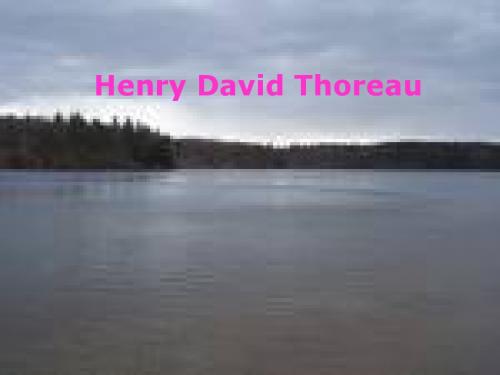
Other works: A Week on the Concord and Merrimack Rivers 《康克德和梅里马科河上的 一周》 A Plea for John Brown 《为约翰· 布朗 请命》
Critical Responses
Poet John Greenleaf Whittier criticized what he perceived as the message in Walden that man should lower himself to the level of a woodchuck (美洲旱獭) and walk on four legs. He said: "Thoreau's Walden is a capital reading, but very wicked and heathenish... After all, for me, I prefer walking on two legs
father of environmental movement
From Mr Lin Yutang
林雨堂先生在《论生活的重要性》中写道: “就其整个人生观来说,梭罗在美国作家中最 具中国情趣.作为中国人,我感觉与梭罗心心 相通。我可以将梭罗的文字译成中文, 把它们当作中国诗人的诗作向国人展示。 没有人会产生怀疑。”
Civil Disobedience (1849)
Another famous essay: Civil Disobedience (1849) 论公民的不服从 this is from his staying in Concord jail for a night because he disapproved of slavery and the government’s conduct of the Mexican War
Why_We_Love_Henry_David_Thoreau,_in_5_Quotes_五句引言揭

亨利· 戴 维· 梭 罗 是 最 受 喜爱和最不为人理解的 美国作家之一。在马萨诸塞州 林间的瓦尔登湖畔,他搭建了 一间小木屋,于此隐居两年, 思考自然和哲学。他因此闻名 于世。但梭罗并不是一个隐士 或古怪的厌世者。用杰弗里·S. 克拉默的话简单来说,梭罗是 一个“发问者”。克拉默是瓦 尔登森林梭罗研究所的收藏品 负责人,同时,他撰写和编辑 了十几本关于梭罗和他的挚 友——超验主义者拉尔夫·沃 尔多·爱默生的书籍。
英语世界 2022·04
68 读书
“Can you imagine how differently every student would feel about who they are?” asks Cramer. “We need to be proud of who we are, whatever that looks like, and live the life that only we are destined to live.”
Born in 1817 in Concord, Massachusetts, Thoreau never married and worked as a teacher, lecturer, handyman, pencil-maker (his father’s business) and a writer. His best-known
Henry David Thoreau解析
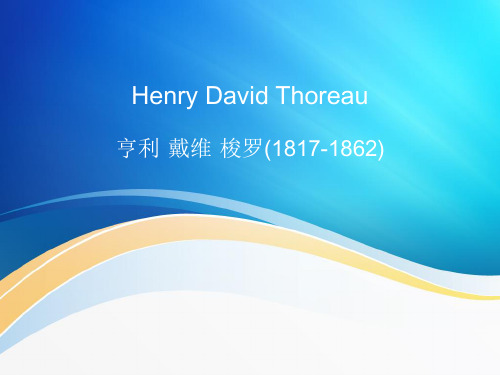
命》
Influence
• the father of environmental movement • "美国性格的奠基人"——赵启光(比较文学专家,
美国卡尔顿大学亚洲研究系主任、亚洲语言文学 系教授) • influenced a number of public figures: • political leaders and reformers:Mahatma Gandhi,President John F.Kennedy,Martin Luther King, Leo Tolstoy • artists and authors: William Bulter Yeats, Ernest Hemingway, Frank Lloyd Wright • naturalists: John Burroughs,John Muir,E.O.Wilson,Henry Stephens Salt
an unjust state.
• 《瓦尔登湖》是19世纪美 国作家梭罗的一部文学名 作。作为他的主要著作之 一,《瓦尔登湖》是梭罗 在瓦登湖林中二年零二个 月又二天的生活和思想纪 录。这是一本清新、健康、 引人向上的书,它向世人 揭示了作者在回归自然的 生活实验中所发现的人生 真谛--如果一个人能满足 于基本的生活所需,其实 便可以更从容、更充实地 享受人生。
• 一个有时间增加他灵魂的财富的人才能真正享受 闲暇。
• 灵魂的必需品并不需要用金钱来购买。
• 你必须活在当下,乘着每一个波浪前行,在每一 刻找到你的永恒。傻瓜站在他们的机会之岛上寻 找另一片陆地。没有别的陆地,除了这一生,没 有别的生命。
• 生命并没有价值,除非你选择并赋予它价值。没 有哪个地方有幸福,除非你为自己带来幸福。
亨利戴维梭罗的语录

亨利戴维梭罗的语录亨利·戴维·梭罗(Henry David Thoreau)是19世纪美国的一位作家、思想家和社会改革者。
他以其对自然界的热爱、个人主义的追求和对社会问题的思考而闻名。
梭罗的语录中充满了深度和智慧,对人们的生活和价值观提出了激发思考的问题。
下面是一些精选的亨利·戴维·梭罗语录,希望对您有所启发。
1. "It's not what you look at that matters, it's what you see."(重要的不是你所看到的,而是你所看到的东西。
)这句话提醒我们,在审视世界的时候,关注的不仅仅是表面现象,还有我们内心对事物的理解和感悟。
我们每个人的视角和经历都不同,因此对于同一事物可能会有不同的解读。
在审视问题时,保持开放的心态,不断思考和挖掘更深层次的意义,才能真正从中获益。
2. "What lies before us and what lies behind us are tiny matters compared to what lies within us."(与我们内在的东西相比,我们面前和身后的一切都微不足道。
)这句话告诉我们,内心的力量和潜能远远超过了周围的环境和外部的限制。
我们每个人都有无穷的可能性,无论是过去的失败还是未来的困难都不应该成为我们前进的阻碍。
关注内在的力量和智慧,发掘自己的潜能,才能真正实现成功和成长。
3. "I went to the woods because I wished to live deliberately, to frontonly the essential facts of life, and see if I could not learn what it had to teach, and not, when I came to die, discover that I had not lived."(我去了森林,因为我希望过有意义的生活,面对生活中只有重要的事实,并看看我是否能够从中学到它能教给我的东西,而不是当我临死时,才发现自己并没有真正活过。
Henry David Thoreau美国超验主义作家梭罗简介及《瓦尔登湖》赏析英文PPT
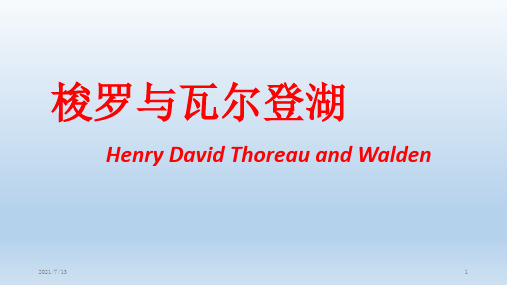
2021/7/13
28
➢I should not speak so much about myself if there were any body else whom I knew as well. (Economy:2)
4
The life Introduction
1817年7月12日,出生于马萨诸塞州 的康科德。 1833到1837年间,梭罗在哈佛大学 修读修辞学、经典文学、哲学、科 学和数学。期间曾聆听了爱默生的 著名演讲《美国学者》(The American Scholar )。
曾经步行18英里去听爱默生的演讲 。
的主观能动性;蔑视外部的权威与传统,依赖自己的直接经验; 崇尚自由独立的精神
2021/7/13
26
Comments
《瓦尔登湖》语语惊人,字字闪光,沁人心肺,动我衷肠。到
了夜深人静,万籁无声之时,此书毫不晦涩,清澈见底,吟诵之下
不禁为之神往了。
---徐迟
2021/7/13
27
Appreciation
“从明天起,关心粮食和蔬菜 我有一所房子 面朝大海,春暖花开”
2021/7/13
3
2021/7/13
亨利·戴维·梭罗(Henry David Thoreau, 1817年7月12日-1862年5月6日), 美国作家、哲学家、废奴主义者、超 验主义者,也曾任职土地勘测员。
著名作品有:散文集《瓦尔登湖》(又 译为《湖滨散记》)和《公民不服从 》(又译为《消极抵抗》、《论公民抗 命》、《公民不服从论》 ) Resistance to Civil Government (also known asCivil Disobedience) )。 《瓦尔登湖》记载了他在瓦爾登湖的 隐逸生活,而《公民不服从》则讨论 面对政府和强权的不义,为公民主动 拒绝遵守若干法律提出辩护。
THOREAU梭罗资料
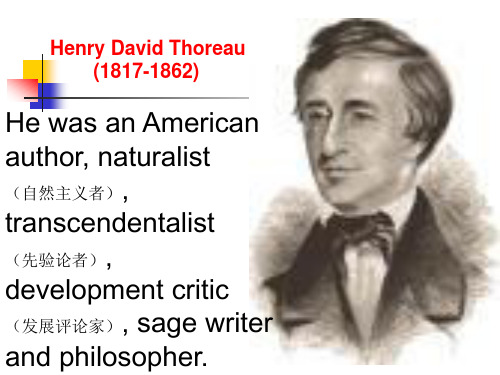
Ideas
Transcendentalism(超验主义) Individualism(个人主义) Materialism(唯物主义) Anarchism(无政府主义)
Transcendentalism(超验主义)
Individualism (个人主义)
“any man more right than his neighbors,
constitutes(构成)a majority of one .” Civil Disobedience
Practiced this view in his own life consistently Encouraged others to assert(维护) their
jailed experience in 1846, embodying(体 现) the pioneering spirit(开拓精神)of the American frontiersman(边远者)and a development of the philosophy in the
Declaration of Independence, having a
but at once a better government.” Civil Disobedience
“That government is best which governs not at all; and when men are prepared for it, that will be the kind of
领导人是美国思想家、诗人拉尔夫·沃尔多·爱默生。
transcendentalism (超验主义)
Henry David Thoreau美国超验主义作家梭罗简介及《瓦尔登湖》赏析英文PPT课件.
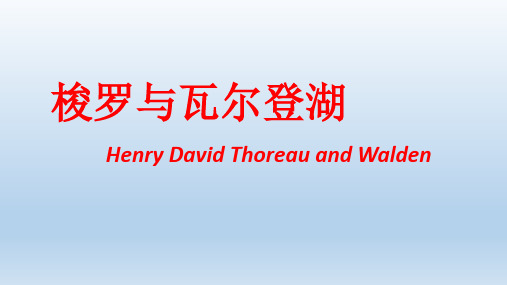
Henry David Thoreau and Walden
《梭罗这人有脑子》---海子
梭罗这人有脑子 像鱼有水、鸟有翅 云彩有天空
…… 梭罗这人有脑子 梭罗手头没有别的 抓住了一根棒木 那木棍揍了我 狠狠揍了我 像春天揍了我
…… 梭罗这人有脑子 看见湖泊就高兴
……
梭罗这人有脑子 不言不语让东窗天亮西窗天黑 其实他哪有窗子 梭罗这人有脑子 不言不语做男人又做女人 其实生下的儿子还是他自己
“最好的政府一无所治;在人们准备好之前 ,那将是他们愿意拥有的那种政府。”
---梭罗
• “难道公民必得将良心交给立法者, 自己一分也不留?若此,则人有良心 何为?我认为我们首先必须是人,然 后再谈是不是被统治者。...则此 法律不值得尊重——去违反这样的法律 吧。...。如果一千个人今年拒绝 缴税,跟同意缴税相比,前者不算是 暴力与血腥的手段,因为缴税将可能 使国家使用暴力、且使无辜者流血。 事实上,这就是和平革命”( peaceable revolution)。
• 他从来不懒惰或是任性,他需要钱的时 候,情愿做些与他性情相近的体力劳动 来赚钱——如造一只小船或是一道篱笆 ,种植、接枝、测量,或是别的短期工 作——而不愿长期地受雇。
• 梭罗认为,人们一周当中只应工作 一天,其余的六天用来思考。
• 他父亲制造铅笔,亨利有一个时期也研究这 行手艺,他相信他能够造出一种铅笔,比当 时通用的更好。他完成他的实验之后,将他 的作品展览给波士顿的化学家与艺术家看, 取得他们的证书,保证它的优秀品质,此后 他就满足地回家去了。他的朋友们向他道贺 ,因为他辟出了一条致富之道。但是他回答
著名作品有:散文集《瓦尔登湖》(又 译为《湖滨散记》)和《公民不服从 》(又译为《消极抵抗》、《论公民抗 命》、《公民不服从论》 ) Resistance to Civil Government (also known asCivil Disobedience) )。 《瓦尔登湖》记载了他在瓦爾登湖的 隐逸生活,而《公民不服从》则讨论 面对政府和强权的不义,为公民主动 拒绝遵守若干法律提出辩护。
Henry David Thoreau
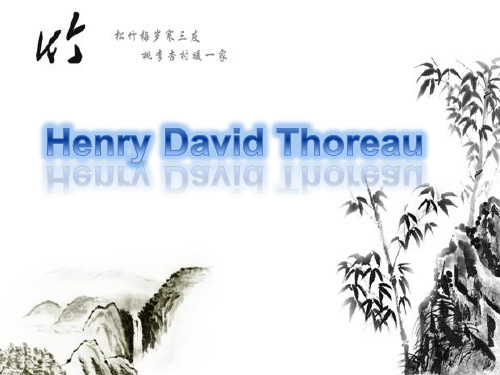
• 这本书反映出人与自然的神性。他不仅是 爱默生的忠实信徒,他是一个泛神主义— —把自然界的万物都具有神性。他坚定地 认为自然界中的万物都是具有象征意义的 ,它能表达出我们的思想和感情。沃尔登 的文体特征,在美国文学史上是非常著名 的。
• Thoreau's writings influenced many public figures. • Political leaders and reformers like Mahatma Gandhi, President John F. Kennedy, civil rights activist Martin Luther King, Jr. • Russian author Leo Tolstoy William Butler Yeats, Ernest Hemingway,
• He saw nature as a genuine restorative ,healthy influence on man’s spirit .He tried to seek a way to unlock the secret of spirit.”Let us not underrate the value of a fact ;it will one day flower into a truth, ” he thus wrote.
Life Experience from Thoreau
• Enjoy the pleasure of talking • A man is rich in proportion to the number of things which he affords to let alone • A stitch in time saves nine • Simplify, simplify. Instead of three meals a day, if it be necessary eat but one…
Henry·David·Thoreau

• 8. THE VILLAGE (村庄)
• 9. THE PONDS (湖泊)
CONTENTS
• 10. BAKER FARM (贝克农场) • 11. HIGHER LAWS (更崇高的法则) • 12. BRUTE NEIGHBORS (与野兽为邻) • 13. HOURSE-WARMING (室内取暖) • 14. FORMER INHABITANTS ;AND WINTER VISITORS (往昔居民;冬日来客) • 15. WINTER ANIMALS (冬季动物) • 16. THE POND IN WINTER(冬季湖泊) • 17. SPRING (春天)
• but, considering the circumstances, very natural and pertinent. Some have asked what I got to eat; if I did not feel lonesome; if I was not afraid; and the like. Others have been curious to learn what portion of my income I devoted to charitable purposes; and some, who have large families, how many poor children I maintained. I will therefore ask those of my readers who feel no particular interest in me to pardon me if I undertake to answer some of these questions in this book.
人物介绍:亨利·大卫·索罗 Henry David Thoreau

Henry David Thoreau
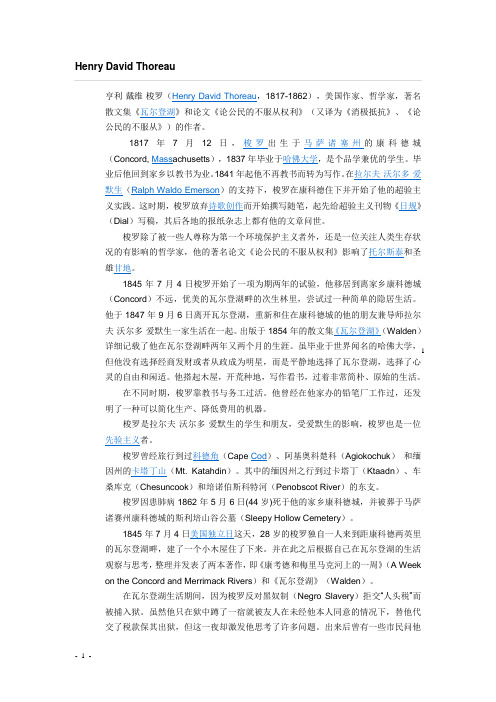
1 Henry David Thoreau亨利·戴维·梭罗(Henry David Thoreau ,1817-1862),美国作家、哲学家,著名散文集《瓦尔登湖》和论文《论公民的不服从权利》(又译为《消极抵抗》、《论公民的不服从》)的作者。
1817年7月12日,梭罗出生于马萨诸塞州的康科德城(Concord, Mass achusetts ),1837年毕业于哈佛大学,是个品学兼优的学生。
毕业后他回到家乡以教书为业。
1841年起他不再教书而转为写作。
在拉尔夫·沃尔多·爱默生(Ralph Waldo Emerson )的支持下,梭罗在康科德住下并开始了他的超验主义实践。
这时期,梭罗放弃诗歌创作而开始撰写随笔,起先给超验主义刊物《日规》(Dial )写稿,其后各地的报纸杂志上都有他的文章问世。
梭罗除了被一些人尊称为第一个环境保护主义者外,还是一位关注人类生存状况的有影响的哲学家,他的著名论文《论公民的不服从权利》影响了托尔斯泰和圣雄甘地。
1845年7月4日梭罗开始了一项为期两年的试验,他移居到离家乡康科德城(Concord )不远,优美的瓦尔登湖畔的次生林里,尝试过一种简单的隐居生活。
他于1847年9月6日离开瓦尔登湖,重新和住在康科德城的他的朋友兼导师拉尔夫·沃尔多·爱默生一家生活在一起。
出版于1854年的散文集《瓦尔登湖》(Walden )详细记载了他在瓦尔登湖畔两年又两个月的生涯。
虽毕业于世界闻名的哈佛大学,但他没有选择经商发财或者从政成为明星,而是平静地选择了瓦尔登湖,选择了心灵的自由和闲适。
他搭起木屋,开荒种地,写作看书,过着非常简朴、原始的生活。
在不同时期,梭罗靠教书与务工过活。
他曾经在他家办的铅笔厂工作过,还发明了一种可以简化生产、降低费用的机器。
梭罗是拉尔夫·沃尔多·爱默生的学生和朋友,受爱默生的影响,梭罗也是一位先验主义者。
- 1、下载文档前请自行甄别文档内容的完整性,平台不提供额外的编辑、内容补充、找答案等附加服务。
- 2、"仅部分预览"的文档,不可在线预览部分如存在完整性等问题,可反馈申请退款(可完整预览的文档不适用该条件!)。
- 3、如文档侵犯您的权益,请联系客服反馈,我们会尽快为您处理(人工客服工作时间:9:00-18:30)。
Simple
living and self-sufficiency were Thoreau's other goals, and the whole project was inspired by transcendentalist philosophy, which was one of the key ideas of the American Romantic Period. As Thoreau made clear in his book, his cabin was not in wilderness but at the edge of town, not far from his family home
Solitude
Thoreau rhapsodizes about the beneficial effects of living
solitary and close to nature. He loves to be alone, for "I never found the companion that was so companionable as solitude," and he is never lonely as long as he is close to nature. He believes there is no great value to be had by
“…I
went to the woods because I wished to live deliberately, to front only the essential facts of life…I did not wish to live what was not life, living is so dear; nor did I wish to practise resignation, unless it was quite necessary. I wanted to live deep and suck out all the marrow of life…” ___Walden
Synopsis (contents)
Where I Lived, and What I Lived For
After playing with the idea of buying a farm, Thoreau
describes his cabin's location. Then he explains that he took up his abode at Walden Woods so as to "live deliberately, to front only the essential facts of life, and see if I could not learn what it had to teach, and not, when I came to die, discover that I had not lived."
Walden
Background
information Synopsis (contents) Themes
Background information about Walden
A reproduction of Thoreau's cabin with a statue of Thoreau
Henry David Thoreau
1817- 1862
Henry David Thoreau (1817- 1862)
an American author, naturalist, transcendentalist, tax resister, development critic, surveyor, sage writer and philosopher. He is best known for his book Walden, a reflection upon simple living in natural surroundings, and his essay, Civil Disobedience, an argument for individual resistance to civil government in moral opposition to an unjust state.
Background information about Walden
The book details Thoreau's sojourn in a cabin near Walden Pond, amidst woodland owned by his friend and mentor Ralph Waldo Emerson, near Concord, Massachusetts. Thoreau did not intend to live as a hermit, for he received visitors and returned their visits. Instead, he hoped to isolate himself from society in order to gain a more objective understanding of it. .
Henry David Thoreau (1817- 1862)
Life
Works Walden
Life
Born in a common family in New England Graduated from Harvard, but only stayed at home and helped family business A friend of Emerson Active in social life and had a strong sense of justice (Example: He once refused to pay a poll-tax of 2 dollars because he felt the tax was unfair, and thus he was jailed. And later he wrote an essay named "Civil Disobedience" which advocated passive resistance to unjust laws and influenced Gandhi in India.(甘地的非暴力不合作运动) not successful as a writer and lived in obscurity all his life
Reading
Thoreau provides discourse on the benefits of reading
classical literature (preferably in the original Greek or Latin) and bemoans the lack of sophistication in Concord, manifested in the popularity of popular literature. He yearns for a utopian time when each New England village will support "wise men" to educate and thereby ennoble the population.
Synopsis (contents)
Economy
This is the first chapter and also the longest by far.
Thoreau begins by outlining his project: a two-year and two-month stay at a crude cabin in the woods near Walden Pond. He does this, he says, in order to illustrate the spiritual benefits of a simplified lifestyle. He easily supplies the four necessities of life (food, shelter, clothing, and fuel). He meticulously records his expenditures and earnings, demonstrating his understanding of "economy," as he builds his house and buys and grows food. For a home and freedom, he spends a mere $28.13.
Complementary Verses
This chapter consists entirely of a poem, "The
Pretensions of Poverty," by seventeenth-century English poet Thomas Carew. The poem criticizes those who think that their poverty gives them unearned moral and intellectual superiority.
Works (Selected)
A Week on the Concord and Merrimack Rivers, 1849 Resistance to Civil Government / Civil Disobedience / On the Duty of Civil Disobedience, 1849 Walden; or, Life in the Woods, 1854 Excursions, 1863 The Maine Woods, 1864 Slavery in Massachusetts, 1854
